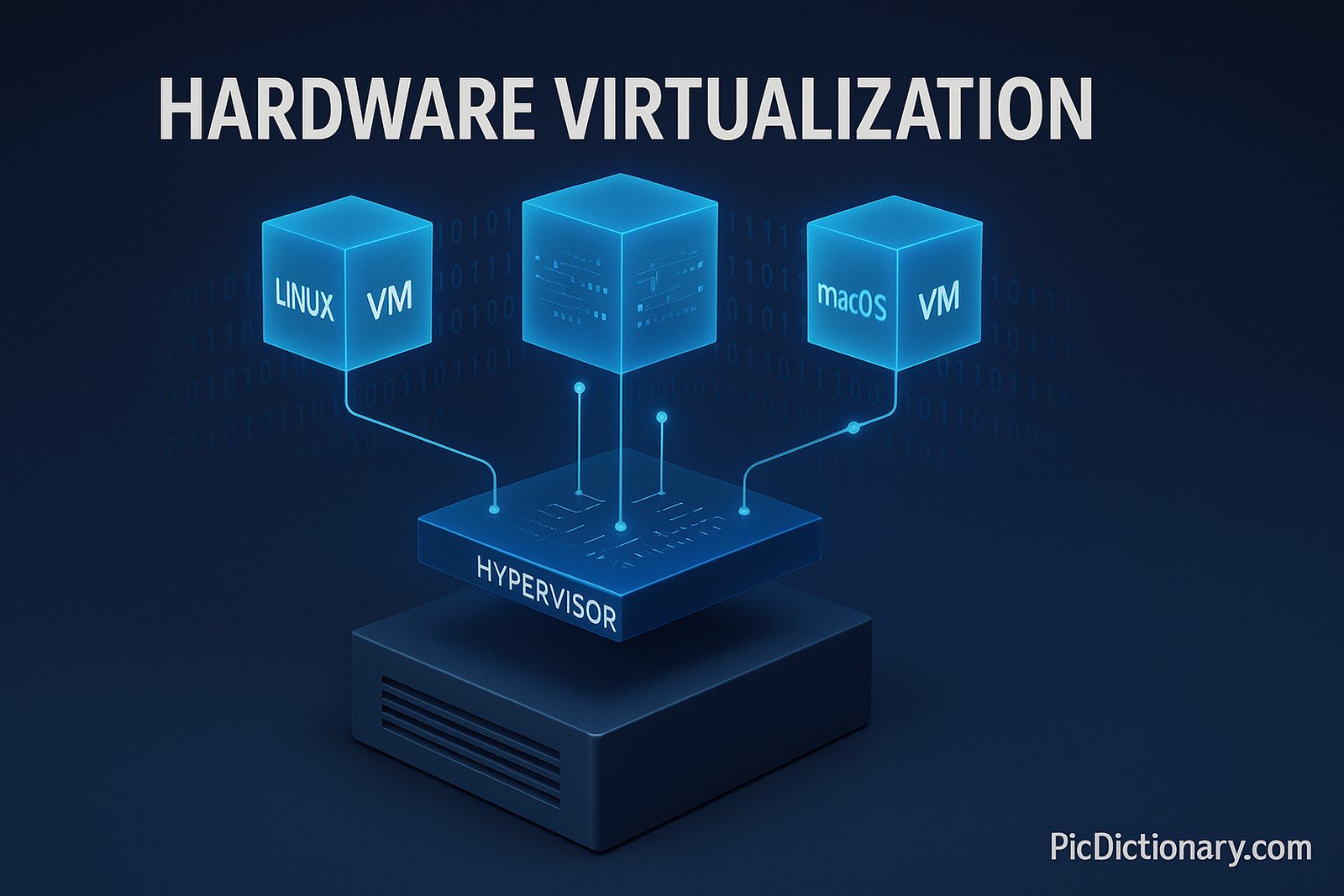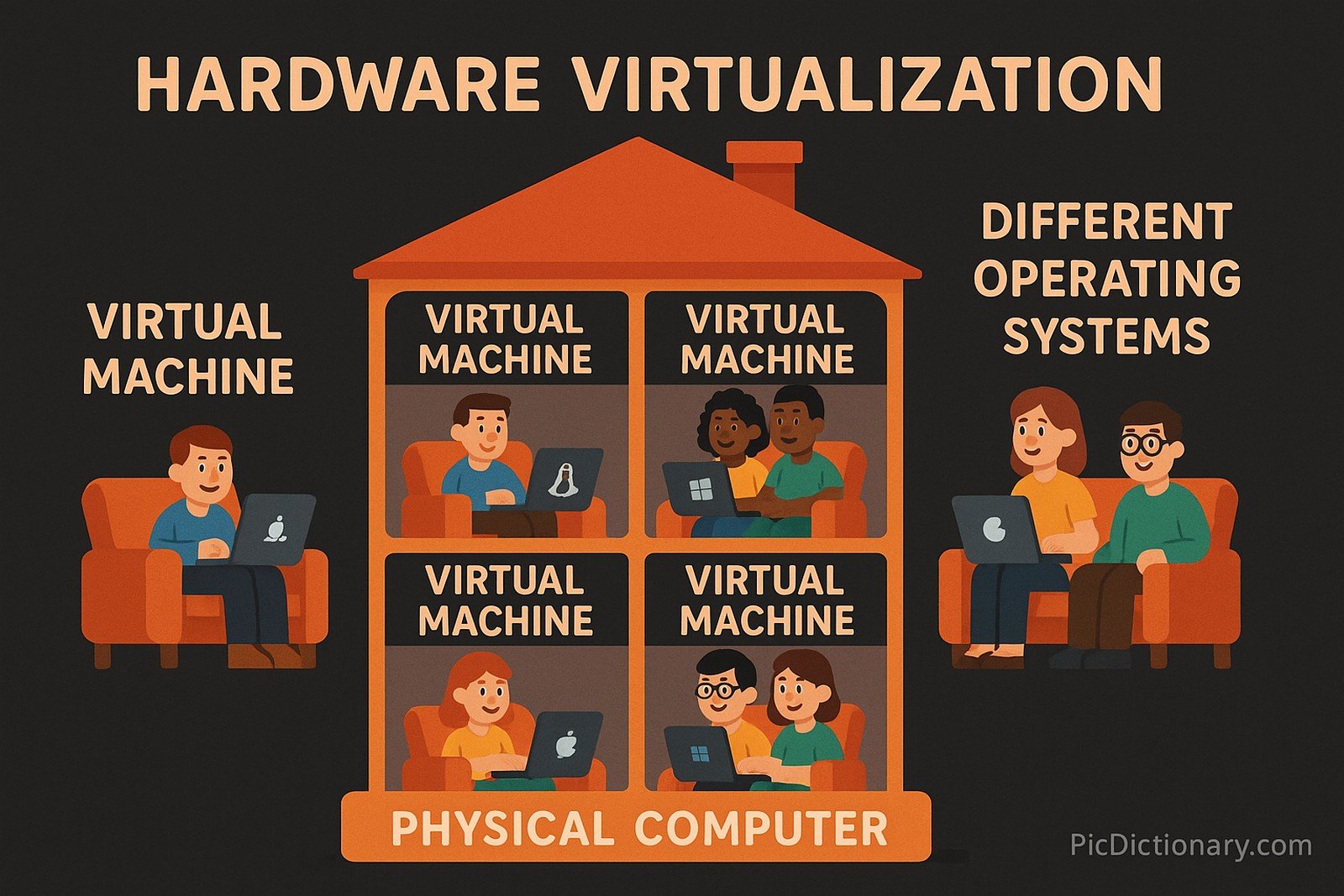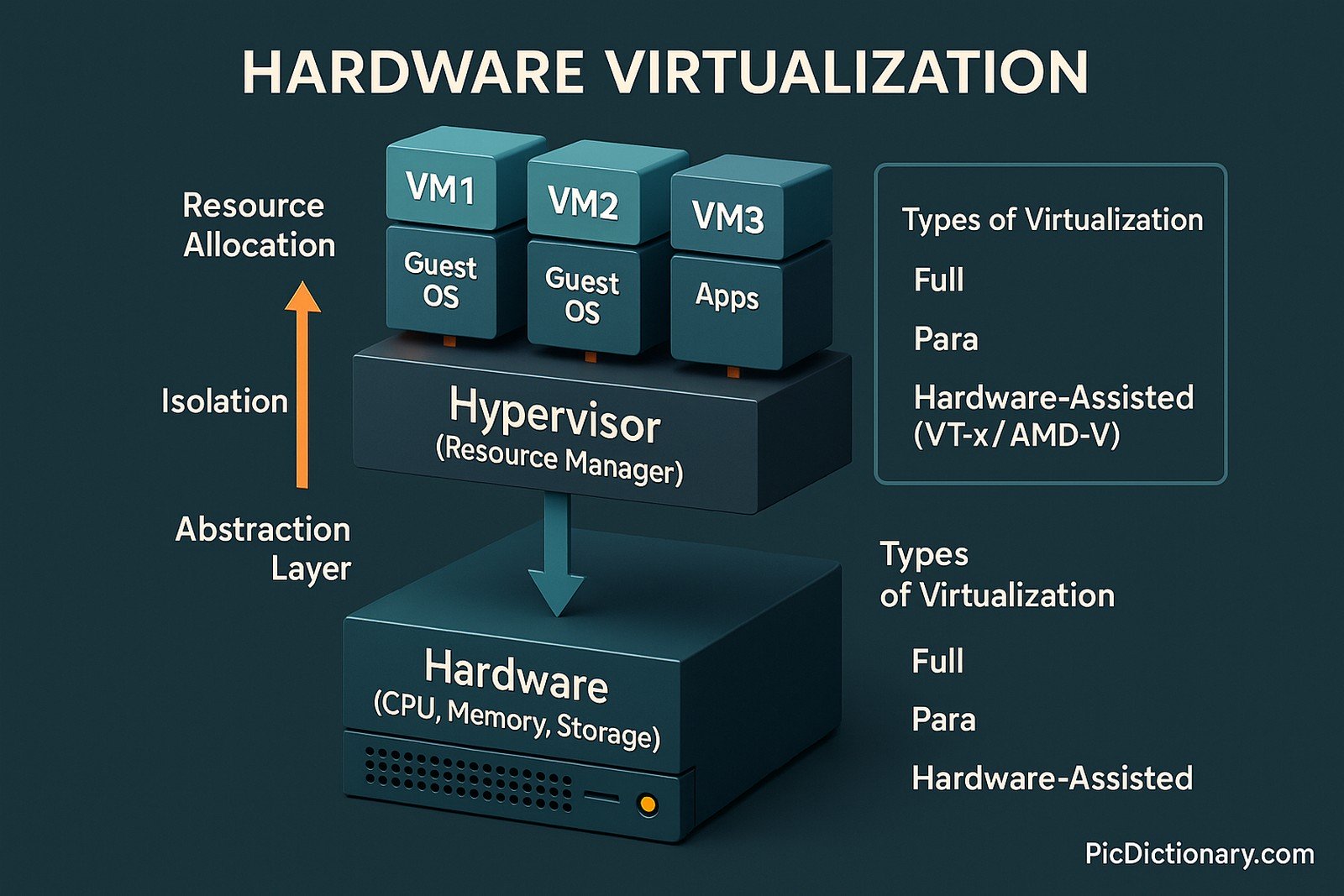Hardware Virtualization

Quick Navigation:
- Hardware Virtualization Definition
- Hardware Virtualization Explained Easy
- Hardware Virtualization Origin
- Hardware Virtualization Etymology
- Hardware Virtualization Usage Trends
- Hardware Virtualization Usage
- Hardware Virtualization Examples in Context
- Hardware Virtualization FAQ
- Hardware Virtualization Related Words
Hardware Virtualization Definition
Hardware virtualization is a technology that enables multiple operating systems to run on a single physical machine by abstracting hardware resources. It relies on a hypervisor, which manages and allocates computing resources like CPU, memory, and storage to virtual machines (VMs). This approach enhances resource efficiency, scalability, and security while reducing hardware costs. Common types include full virtualization, para-virtualization, and hardware-assisted virtualization, with technologies like Intel VT-x and AMD-V supporting hardware-level optimization.
Hardware Virtualization Explained Easy
Imagine your computer is a big house, but instead of letting only one family live in it, you divide it into separate apartments so multiple families can live independently. Each family has its own space, but they all share the same building. Hardware virtualization works the same way—it splits one physical computer into multiple virtual computers, letting different operating systems run at the same time without interfering with each other.
Hardware Virtualization Origin
Hardware virtualization traces its roots back to the 1960s, when IBM developed mainframe systems that could run multiple processes simultaneously. As computing evolved, the need for more efficient use of hardware resources led to the widespread adoption of virtualization in the early 2000s, especially in cloud computing and data centers.
Hardware Virtualization Etymology
The term "hardware virtualization" comes from "hardware," referring to physical computing devices, and "virtualization," which means creating a virtual version of something. The combination signifies the technique of abstracting physical hardware into virtual components.
Hardware Virtualization Usage Trends
With the rise of cloud computing, hardware virtualization has become essential for businesses seeking to optimize server utilization, reduce operational costs, and improve disaster recovery strategies. It is extensively used in enterprise IT infrastructure, cloud services (AWS, Google Cloud, Azure), and cybersecurity to isolate environments for secure computing. The demand for virtualization continues to grow with advancements in containerization technologies like Docker and Kubernetes.
Hardware Virtualization Usage
- Formal/Technical Tagging:
- Virtualization Technology
- Cloud Computing
- Hypervisors
- Virtual Machines - Typical Collocations:
- "hardware virtualization technology"
- "virtual machine hypervisor"
- "hardware-assisted virtualization"
- "cloud infrastructure virtualization"
Hardware Virtualization Examples in Context
- Cloud providers use hardware virtualization to host multiple virtual machines on a single server, optimizing resource usage.
- IT teams implement hardware virtualization to run legacy applications in isolated virtual environments without needing separate physical machines.
- Cybersecurity experts use virtual machines to analyze malware safely in a contained virtualized environment.
Hardware Virtualization FAQ
- What is hardware virtualization?
Hardware virtualization is a technology that allows multiple operating systems to run on a single physical computer by creating virtual machines. - What are the types of hardware virtualization?
The main types are full virtualization, para-virtualization, and hardware-assisted virtualization. - What is a hypervisor in hardware virtualization?
A hypervisor is software or firmware that manages virtual machines by allocating system resources like CPU, memory, and storage. - What is the benefit of hardware-assisted virtualization?
Hardware-assisted virtualization improves performance by leveraging CPU extensions like Intel VT-x and AMD-V to optimize virtual machine execution. - How does hardware virtualization help cloud computing?
It allows cloud providers to run multiple virtual servers on a single physical machine, reducing costs and improving scalability. - Is hardware virtualization secure?
Yes, it enhances security by isolating virtual environments, preventing interference between different virtual machines. - What is the difference between hardware virtualization and software virtualization?
Hardware virtualization abstracts physical hardware, while software virtualization creates virtualized software environments like containers. - Can hardware virtualization improve system performance?
Yes, it optimizes resource usage, but performance depends on hardware support and proper configuration. - What are common hypervisors used in hardware virtualization?
Popular hypervisors include VMware ESXi, Microsoft Hyper-V, and KVM (Kernel-based Virtual Machine). - Is hardware virtualization necessary for running virtual machines?
Not always, but it significantly enhances virtual machine performance and efficiency when supported by the processor.

Hardware Virtualization Related Words
- Categories/Topics:
- Cloud Computing
- Virtualization Technology
- Data Centers
- Cybersecurity
Did you know?
One of the first mainstream uses of hardware virtualization was in gaming—Sony's PlayStation 2 used a form of virtualization to run PlayStation 1 games, making it an early example of backward compatibility using virtualized hardware.
PicDictionary.com is an online dictionary in pictures. If you have questions or suggestions, please reach out to us on WhatsApp or Twitter.Authors | Arjun Vishnu | @ArjunAndVishnu

I am Vishnu. I like AI, Linux, Single Board Computers, and Cloud Computing. I create the web & video content, and I also write for popular websites.
My younger brother, Arjun handles image & video editing. Together, we run a YouTube Channel that's focused on reviewing gadgets and explaining technology.



Comments powered by CComment